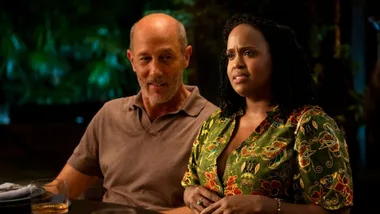Sometimes the happiness teacher fails her own class. Dr Laurie Santos is a professor of psychology and the teacher behind the Yale University’s most popular course in over 300 years, which in twice-weekly lectures breaks down how to be happy.
More than 4.5 million people have taken the online version of the class (called The Science of Well-being), and her podcast (The Happiness Lab) has over 85 million downloads. If anyone understands the mechanics of happiness, it’s Santos. So why does she – like all of us – struggle to hold onto that slippery little sucker: happiness?
“I think the biggest barrier to our happiness is the misconceptions we have,” she explains. “We all assume that we know what will make us happier; often that’s big changes to our circumstances, like more money or promotions at work and so on. But research shows that we’re often mistaken.”
In the new season of The Happiness Lab, Santos opens up about the “happiness demons” she struggles with: crippling perfectionism, chronic stress and a paralysing fear of death. “I wanted to be as honest as possible because I think it’s important for listeners to know that I struggle too,” she says. “I’m human and it makes sense that I also fall prey to things like boredom and busyness and overwhelm.”
For her, the antidotes include learning to be present, calling in self-compassion and addressing a lifelong intolerance of boredom. She cites a study published in the journal Science in which 67 per cent of men and 25 per cent of women chose to give themselves a small electric shock rather than sit quietly in a room doing nothing for 15 minutes.

“I’ve tried equally pathetic ways to escape boredom,” says Santos. “I can’t remember the last time I stood in a checkout line without whipping out my phone. I repeatedly re-check email inboxes that I know are empty. I re-scroll news sites that I have already read through. I boredom snack … a lot. It’s pretty embarrassing for a so-called happiness expert.” It’s gripping listening because, let’s face it, we’re all obsessed with how to be happier.
Across the world, researchers are rushing to find the secret to happiness, examining the impact of our diets, our genes, our hormones and our bedtimes.
The future of wearables is predicted to be “implantable cortisol-sensing electronics” that can alert us when our stress levels are rising (presumably so we can do something about it). It’s fair to say we’ve never spent so much energy – or money – trying to be happy. And yet (spoiler alert!), it seems like we’re really not nailing it.
The Australian Bureau of Statistics (ABS) lays out some depressing data: 42.9 per cent of people aged 16-85 have experienced a mental disorder at some time in their life. Anxiety tops the chart, followed by depression, and the most vulnerable groups include women and people who “identify as gay, lesbian, or bisexual, or who used a different term to describe their sexual orientation”.
As a result, the use of antidepressant and anti-anxiety drugs are on the rise, with 45.6 million mental-health related prescriptions dispensed in Australia in 2022-23, according to the Australian Institute of Health and Welfare.
Even if we’re not depressed, many of us are kind of “meh.” The organisational psychologist Adam Grant popularised the term “languishing ” to describe the “stagnation and emptiness” many people felt after the pandemic. For a while there we could blame post-pandemic fatigue. But as we stumble towards the end of 2024, are we running out of excuses?
Happiness For Sale
Academics have known for a while that, on average, happiness increases with income but at a certain point the benefits start to plateau. However, what that exact number is has been disputed. A 2021 study from the University of Sydney calculated the “change point” (at which income stops increasing happiness) as $74,000 a year.
That number is more attainable than the one in a 2023 report by S Money (using research from America’s Purdue University in 2018), which estimated Australia’s “price of happiness” as $US121,191 (about $190,000). This seems like a good time to mention the median annual earnings in Australia (according to the ABS in 2023): $65,000.

The good news is, we tend to overestimate the link between our mood and our moolah. Yes, Maslow’s Hierarchy of Needs still stands: we all need safety and security, food, water, clothing and shelter. But waiting for a windfall to stop feeling wistful isn’t the answer.
Research published in the Proceedings of the National Academy of Sciences last year found that happiness or emotional wellbeing is a “changing
daily scale” for most people. It also found that “happy people are not all equally happy” – there are “degrees”.
“That’s So Old Happy”
Wellbeing expert Stephanie Harrison is the founder of the company The New Happy and author of the book New Happy. After studying happiness at university, her knowledge was put to the test when her partner, Alex, was struck down with a mysterious illness. Over the next four years, while she put her career on hold to become his carer, she noticed a curious contradiction: she was happy, albeit a different kind of happiness from the version her younger self had chased.
“It was shocking to compare my 2013 self, who had everything going ‘right’ and yet felt lost, miserable and isolated, to my 2018 self, who had everything going ‘wrong’ and yet felt far more peace, joy and purpose,” says Harrison. “My next, and most important, question was: would this philosophy work for others?”
This question led to the creation of The New Happy, which started as a free weekly newsletter, incorporating the findings of experts across science, economics and religion (today, more than 1 million people a month consume the content). Harrison champions the end of Old Happy and the dawn of New Happy – a bold change to the way we view emotional contentment, and what it takes to achieve.

Old Happy is shaped by three dominant forces, she says: individualism, capitalism and domination. It tells us: you don’t need other people; figure it out for yourself; you must be successful; you can’t rest; you are lacking something; you need to achieve more!
“It’s not your fault if you’re unhappy,” says Harrison. “You have been told a lie. The truth is, you are enough, you have unique and important gifts, and using them to help other people leads to happiness,” which is New Happy in a nutshell.
Step one is to start calling out your archaic beliefs, she advises. When you look in the mirror and hear that voice criticising your appearance, say, “That’s Old Happy’s voice, not mine.” When you see a manager celebrating a person working late, say, “They are encouraging Old Happy behaviours.”
When you feel like you can’t ask for help, say, “That’s Old Happy lying to me.” Now you can start to ask yourself: what do I really want, and how can I lift other people with me?
Happiness Is A Team Sport
Sorry introverts, but there’s one clear truth: a key to happiness is connection and community. The Harvard Study of Adult Development – which spanned 85 years – found that close positive relationships, more than money or fame, are what keeps people happy throughout their lifetime.
It could explain why, according to a study commissioned by National Australia Bank in late 2022, Australians living in rural areas are some of the happiest people in the country, citing the benefits of being close to nature and having a strong sense of community.
In the book Build the Life You Want, which professor and social scientist Arthur C. Brooks wrote with Oprah Winfrey, Brooks paints a realistic image of relationship harmony, which includes the odd, unavoidable argument. “Think of conflict like the bill for a meal at a restaurant,” he writes. “The only way for it to be zero is not to order the meal.”
The High-Low Life
Corporate executive-turned-therapist Penny Locaso runs Hacking Happy, a company with the sole intent of helping others live happier lives. In our interview, she introduced me to the term “emodiversity”, which is short for emotional diversity. “There is a misconception that happy people are happy 24/7,” says Locaso. “The reality is, those who live the most flourishing lives are those who allow themselves to fully experience all feelings – the good and the bad. They don’t squash the anger, the sadness or the angst. They seek to be curious about it.”
Research published in the Journal of Experimental Psychology found that experiencing a diverse mix of emotions was associated with reduced depression.

Here’s where it gets hopeful: those diverse emotions don’t have to be positive. The research found that experiencing a range of “negative” emotions (anger, sadness, embarrassment, fear, guilt and anxiety) was also associated with reduced depression.
“I’ve undertaken over 350 in-depth interviews about happiness with high-performing women, and what kills me is how unkind we can be to ourselves,” says Locaso. “The greater opportunity we have is to show ourselves compassion.”
Gender Inequality
When it comes to happiness, “think like a man” isn’t the way forward. Research shows that men and women do, typically, process emotions differently. Women show more gratitude than men, according to multiple studies. A paper published in The Journal of Neuroscience found that, after seeing a series of emotional images, women maintain a clearer memory of them than men. This could explain why we struggle to “just get over” things.

In the book F*ck Happiness: How the Science of Psychology Ignores Women, author Ariel Gore argues that much of the research into happiness is based on the findings of white men, and doesn’t take into account minority groups and their genuine emotions.
In the 10th anniversary edition of the book, she writes, “Patriarchy promised us lots of shiny things in exchange for pretending to be happy in the face of oppression … To the peddlers of fake cheer, we say fuck off. We can be happy and sad at the same time. And we still don’t have to smile – unless we feel like it.”










